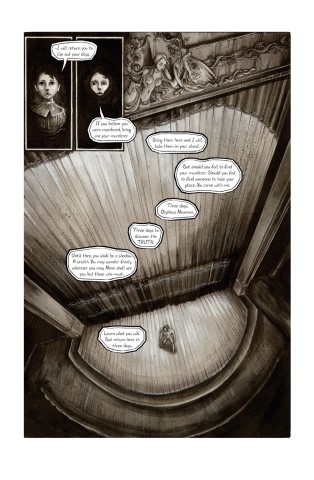Viper Comics continues their trend of releasing
original graphic novels with the graphic novel Orpheus.
Written by Dale Mettam Orpheus is also another attempt at
giving a classic tale, like Nosferatu, a more modern setting.
Does lightning strike twice for Viper?
Orpheus takes
inspiration from the myth of Orpheus and Eurydice. Orpheus is
actually Orpheus Newman the world’s foremost escape artist. Eurydice
is Ellen, his wife, who is constantly begging him to give up his
dangerous profession. On the night that Orpheus attempts his last
escape things go horribly wrong and Orpheus enters into a horrible
pact with Death in an attempt to save his life. So while you’ve got
the myth of Orpheus there are also aspects of things like The
Prestige and Houdini thrown in as well.

Mettam has created a very original tale with an
ending that will leave you shocked and surprised, much like a good
escape artist should. Mettam’s Orpheus deals with some
pretty dark and freaky stuff as Orpheus attempts to find out what
went wrong in his last escape. It’s not exactly a horror tale but
you could call it a very dark noir or Gothic tale with the whole
potential murder mystery aspect. There is a sense of being closed
in, surrounded by death and, well, you are generally chatting to
Death. Funnily enough the character of Death is a really creepy yet
rather wise and insightful one and also a little girl. Yeah, I did
not see that one coming either. The conversations between Orpheus
and Death are also brilliant and a great read and surprisingly a way
to inject a little humor into this otherwise serious tale. The
artwork also helps sell it as a mysterious dark noir tale as it
features predominantly black and white art with a few brownish sepia
tones. What Mettam does really well is help the reader to feel a
connection to Orpheus. I found myself making the same judgments and
coming to the same conclusions as Orpheus to then be as shocked as
Orpheus was later on. There are also some nice little clues from
Mettam for the reader, showing how in control of his story he is.
At only 72 pages you might think that Orpheus
would feel rushed but the book felt perfectly paced. There was a
sense of urgency to the story but it didn’t go at such a blinding
pace that you couldn’t keep up with the characters and what was
going on. About the only problem I had was that I could not really
pick what era the book was supposed to be set in. It was a minor
thing but an annoying thing. Orpheus and his wife were dressed very
early 20th century and spoke in a somewhat posh manor but
then Orpheus’s number one fan was dressed and spoke more like a
modern teenager/youth. It was just a distraction that drew some of
my attention away from the story. I also felt that while 72 pages
suited the book fine there seemed like so much more Mettam could
have explored, like Orpheus’s early days as an escape artist and
near death experiences. I guess that’s a compliment for the book
though that I wanted to stay immersed in the dark, Gothic world
Mettam had created for just a little longer. Curiously I also found
a few little spelling or grammar mistakes, sentences like “Thank,
ladies and gentlemen. Thank you” didn’t quite make sense and once
again broke the spell of the story.
The most stunning aspect of Sallamari
Rantala’s artwork would have to be the use of color or should I say
the various tones and shades of black, brown and white throughout
the story. It almost seemed fitting that a story that focuses on
death is surrounded by such dark and oppressive tones. The character
designs were good, with the women looking like something out of
The Corpse Bride and all the designs generally having a bit of a
ghoulish quality to them. Some people may not like the fact that
Rantala focuses all of his attention on the character’s close up and
any in the background lose definition but I find that it adds to the
effect, making them look almost like ghouls or spirits. The
beginning of chapter two and the scenes in Denny Vildspor’s
apartment also show off some impressive splash pages where Rantala
really shows off his drawing skills.
Altogether I was very impressed with Mettam’s Orpheus and
only wish that it could have been longer. For me it’s the best
Orpheus tale since Nick Cave's epic ballad The Lyre of Orpheus.
Escape artists, a hint of murder, mystery and gorgeous artwork,
what's not to love?